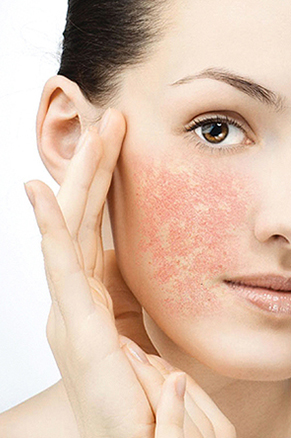
Psoriasis
Psoriasis is a chronic, inflammatory skin condition that can be the source of significant discomfort and feelings of self-consciousness for many people. Currently, over 10 million Americans suffer from psoriasis, making it the most common autoimmune disease in the world.
While psoriasis is a persistent skin condition that is non-contagious, it presents as red scaly patches that can become thick, itchy, and irritating. At Houston Skin, we understand that uncomfortable, visible skin conditions can negatively impact multiple areas of your life including your self-confidence, ability to sleep, and even relationships. That’s why our practitioners at Houston Skin are committed to providing the most effective medical dermatology treatments available for the long-term improvement of psoriasis.
What is Psoriasis?
Psoriasis is an autoimmune disease that causes a person’s immune system to send faulty messages to the brain, telling the skin to grow so quickly that it causes plaques to form. Not only can these plaques vary in size, they can appear on multiple areas of the body, including the knees, elbows, hands, feet, and low back. These thick patches of skin may appear white, silvery, or red.
When psoriasis is mild, the rash may appear on small areas of the body. However, when a patient is suffering from a flare-up, the skin may become itchy and sore, with plaques joining together to cover large areas of the skin. These areas can become inflamed and raised, often with a loose covering of silvery scales.
The 7 forms of psoriasis:
Large plaque: Patients will experience large patches of red, scaly skin, most commonly on the elbows, knees, and lower back but it may also arise on any part of the body.
Guttate: With this skin condition, patient’s skin forms very small pink spots of psoriasis.
Pustular: This condition causes patients to experience a rash that contains pus bumps.
Erythrodermic: With this type of psoriasis, the patient’s entire skin will be red or painful.
Joint or psoriatic arthritis: This condition causes inflammation of the joints that will ultimately destroy the affected areas if left untreated.
Scalp: Patients may also experience red, scaly patches along the scalp. This can be limited to the scalp, or involve other areas of the body.
Nails: Psoriasis can also affect the nails. This can appear as pitting, thickening, or discoloration of the nails. This can be limited or occur in conjunction with other forms of psoriasis.
While psoriasis can occur at any age, most people begin to show symptoms between the ages of 15 and 30 or 50 and 60 years old. However, some children can also suffer from psoriasis.
The exact cause remains unknown, but it is widely accepted that genetics play a strong role. There are also certain psoriasis triggers that can lead to the development of dry, itchy skin including:
- Strep throat
- Certain medications
- Dry, cold weather
- Skin injury
In addition to these triggers, there are also specific factors that can lead to flare-ups or a worsening of symptoms. Some of these factors include dry skin, stress, infection, and exposure to extremes in temperature.
It’s important to understand that, while the physical symptoms are uncomfortable, they are only part of the puzzle when it comes to psoriasis. This skin condition also causes internal inflammation that has been found to be linked to other potentially dangerous health conditions such as diabetes, heart problems, and degenerative joint arthritis.
Managing Psoriasis with Expert Treatment
The first step in managing your psoriasis is getting a definitive diagnosis with one of medical dermatologists at Houston Skin. A diagnosis involves an evaluation of the patches and plaques on your skin and an examination of your nails.
Depending on your type of psoriasis, there are several medical dermatology treatments that we use at Houston Skin Skin to help you manage your symptoms. Some of these treatments include:
MEDICAL GRADE SKIN CARE
Properly managing dry skin is crucial for managing psoriasis symptoms. Our practitioners are skincare experts and will use the most appropriate medical grade skincare products to help moisturize the skin while also reducing inflammation.
MEDICATIONS
Certain prescription drugs can be used to treat moderate to severe psoriasis. These medications are usually administered orally, by injection or intravenously.
TOPICAL STEROIDS
Topical steroids are anti-inflammatory agents that can help provide immediate relief for the swelling and redness caused by psoriasis plaques and lesions.
